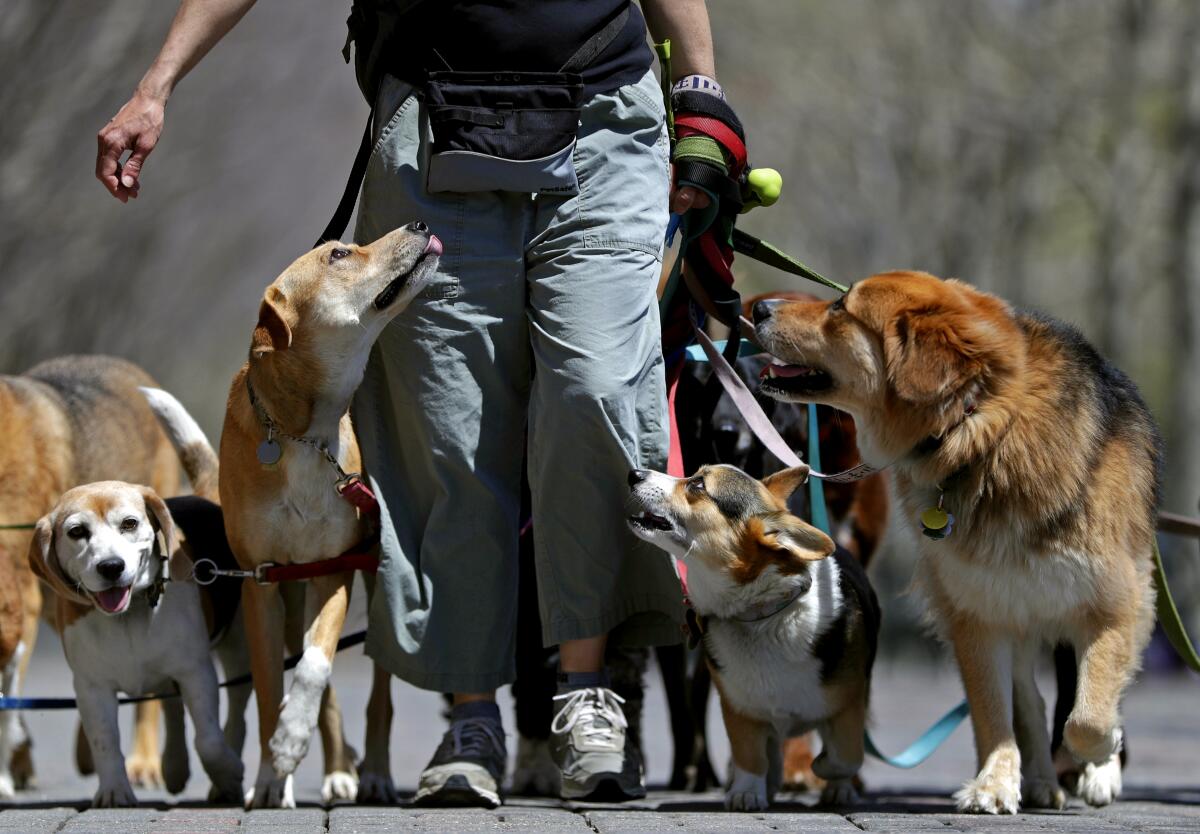Rover, where dog lovers can make a living watching travelers’ ‘fur babies’

- Share via
Dan Simms, 57, has always been something of a master salesman. Selling everything from surgical equipment to business forms over a 30-year career, he commonly earned free trips and other sales incentives for being a top producer. He eventually started his own business, but it folded during the Great Recession. When he went back to sales, the best position he could secure was an hour and a half away from his home on New York’s Long Island.
He says he was doing well professionally, but the commute was miserable. Simms started looking for other ways to make a living. He found dog-sitting with Rover.
Second act
Rover is an online platform that connects dog owners with dog sitters. Simms, a longtime dog owner, thought he’d give it a try. However, instead of looking at watching dogs as a side hustle, Simms took it on as a full-time profession and devoted all of his enthusiasm and business savvy to making it a financial success.
In just 18 months, Simms has become one of Rover’s top hosts in the New York market, earning between $3,000 and $6,000 per month for watching up to 10 dogs a night, he says.
“When I first started doing this, I thought it would be great if we could make enough to pay the mortgage,” Simms said. “Within two months, we were making twice that.”
The platform
Why Rover? There are a handful of factors that make this platform particularly attractive. First, it charges just 20% of your revenue, rather than the 40% that’s charged by competing dog-sitting site Wag. Rover also encourages owners and sitters to meet in a neutral location with the animal before they agree to a gig.
For Simms this meet-and-greet step is important because he’s always watching multiple dogs at the same time. If any of those animals prove aggressive or poorly socialized, it makes Simms’ job a challenge. If Simms gets the impression that the dog won’t fit in with his usual crowd during that initial meeting, he’ll refer the owner to another Rover sitter who is less likely to have competing animals.
Rover customer service representatives also keep in close contact and are willing to help solve problems and listen to Simms’ suggestions about how to make the site better, he says.
“They are making a good buck on me, but the quality of their website is tremendous,” Simms said. “I’ve always spent at least half of my time prospecting for new clients. But I don’t even have to do that. They send me at least two good leads every week.”
Dan’s tips for success
Of course, although Rover is a top-rated gig platform for a lot of good reasons, Simms’ success is primarily attributable to how he approached the business.
Marketing: Instead of passively posting his dog-sitting availability on the site, Simms went out and bought 3,000 business cards. He then started cold-calling travel agents and veterinarians.
His theory was that vacationers are going to ask their vets for dog-boarding recommendations. If the vet doesn’t provide the service, they’d probably be happy to refer clients to someone they’d trust. And travel agents?
“I bet there are times that you think you have a trip booked, but then the couple looks at each other and says, ‘What are we going to do about Max?’” Simms said in his pitch to the travel agents. Nodding in agreement, travel agents took stacks of Simms’ business cards to give to clients whose vacation plans hinged on finding the right pet sitter.
Price: Simms also priced his service well below that of the competition. The going rate in his neighborhood was $45 a night; Simms charged $25.
“I wanted to get at least thirty five-star reviews before I raised my prices,” Simms said.
He now has 247 reviews and more than 100 photographs of his house and canine clients posted on his Rover profile. New clients pay $50 at this point, but he’s grandfathered some old clients at lower rates. And he’s still dreaming up new ways to drum up more business.
Five-star service: “If a dog really hits it off with another dog, we make a note of it,” he says. “The next time there is a booking for either of the two dogs, we let the other family know, so they have the option of a spectacular play date. That has been a big hit.”
If a dog owner has a scheduling problem that makes it difficult to drop off the dog, Simms will provide a pickup. If Simms happens to be planning a vacation at the same time as one of his regular customers, he offers to have another Rover dog sitter take over while he’s gone. Simms provides all the pickup and drop-off services, so the dog owner doesn’t have to worry. Dog need a bath — or even a house call? Simms says he’s happy to oblige.
“If you’ve ever stayed at a Ritz-Carlton, you know that they’ll do all sorts of little things to make your experience better. You don’t have to ask. It’s just part of the service,” Simms said. “That’s what we try to do with our customers and their fur babies.”
Kristof is the editor of SideHusl.com, an independent site that reviews hundreds of money-making opportunities in the gig economy.
More to Read
Inside the business of entertainment
The Wide Shot brings you news, analysis and insights on everything from streaming wars to production — and what it all means for the future.
You may occasionally receive promotional content from the Los Angeles Times.










